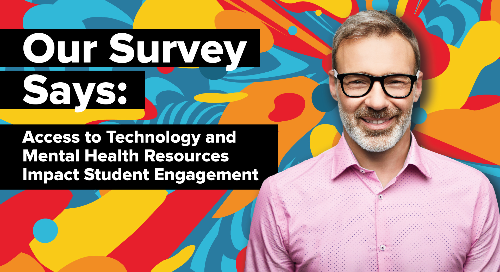Socioeconomic factors greatly impact student engagement. According to our 2021 global benchmark study on the State of Student Success and Engagement, the top four socioeconomic factors impacting student success and engagement increased significantly in importance in 2021.
2020 socioeconomic factors that drive student success:
● 89% access to the internet
● 88% access to learning resources
● 87% access to technology devices
● 88% psychological well-being
2021 socioeconomic factors that drive student success:
● 93% access to the internet
● 92% access to learning resources
● 92% psychological well-being
● 91% access to technology devices
2020 socioeconomic factors that drive student engagement:
● 88% access to the internet
● 86% access to learning resources
● 86% access to technology devices
● 87% psychological well-being
2021 socioeconomic factors that drive student success:
● 92% access to the internet
● 91% psychological well-being
● 90% access to learning resources
● 90% access to technology devices
In an open-ended question seeking additional factors that influence student success, respondents named:
● The support of family and peers
● Environmental concerns
● Access to healthy food
● Time for exercise
● The presence of role models
● Learning disabilities
● Prejudice
● Community safety
● Balancing work and school
The importance of psychological well-being is also cited as a leading factor for student success in every region we surveyed, increasing in percentage of importance from 2020.
At a time when increasing numbers of students are facing anxiety, depression, burnout, and other mental health challenges, as well as food and housing insecurity, higher education institutions are in a unique position to support student well-being.
Fortunately, there’s growing awareness and attention on the importance of mental health within higher education, and a November 2020 survey by the American Council on Education found that the mental health of students and faculty was cited as the most pressing issue for presidents of public and private four-year institutions.
What are Institutions Offering to Support Mental Health?
To support student and faculty mental health, institutions globally are deploying a number of tools, including:
- Offering in-person or virtual counseling services (50%),
- Holding campus well-being events (33%)
- Offering student mentorship programs (32%)
- Offering staff mental health training (25%)
- Utilizing mental health apps (24%)
Globally, opinions vary on how well institutions are responding to mental well-being. North American respondents (43%) and Asia Pacific respondents (41%) are significantly more likely to think their institutions deal with mental health issues well compared to Latin American(35%) and European and Middle Eastern (32%) institutions.
Increased Emphasis on Equitable Access to Education is Vital for Student Success
As institutions continue to increase their emphasis on equitable access to education as it relates to socioeconomic and mental well-being factors, we feel student success, career preparedness, as well as retention, transfer, and ultimately graduation rates may improve.
Empathy and representation are necessary for all students to feel supported. This is true regardless of whether instruction occurs in the classroom, in a hybrid, or in a remote learning environment.
With a deeper understanding of student barriers to success, including access to the internet, technology resources, and mental health concerns, institutions will increase their impact.
For the study, we worked with Hanover Research, and sought the input from 7,687 current students, administrators, and faculty from 2-year, 4-year, public, and private higher education institutions across 18 countries. Our goal: defining measurements of student success and identifying factors for engagement.
Download the Report
Get more insights from our 2021 State of Student Success and Engagement in Higher Education. Download the report now here.
Related Content
 outcomes_first.jpg
outcomes_first.jpgBlogs
 panapto-blog-thumbnail.png
panapto-blog-thumbnail.pngBlogs
 constructor-tech-blog-thumbnail.png
constructor-tech-blog-thumbnail.pngBlogs
